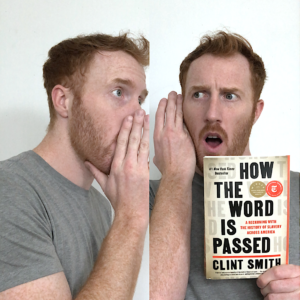 One of the most important ways of remembering history is via the stories we tell about it. In this narrative, Smith visits several historical sites in the United States (including one in Senegal, West Africa) in order to better understand how we tell our stories surrounding the history of slavery. What he found were a series of partially constructed truths, but also many uncomfortable and often completely hidden ones. There is a prison in Angola, Louisiana, for example, that is literally built on top of a plantation that used to house enslaved people. Today, a majority of its prisoners are black. “If in Germany today there were a prison built on top of a former concentration camp, and that prison disproportionally incarcerated Jewish people, it would rightly provoke outrage throughout the world,” Smith justly surmises. “And yet in the United States such collective outrage at this plantation-turned-prison is relatively muted.” Our society seems content to ‘move on’ from slavery, but it’s ugly past is still staring us right in the face.
One of the most important ways of remembering history is via the stories we tell about it. In this narrative, Smith visits several historical sites in the United States (including one in Senegal, West Africa) in order to better understand how we tell our stories surrounding the history of slavery. What he found were a series of partially constructed truths, but also many uncomfortable and often completely hidden ones. There is a prison in Angola, Louisiana, for example, that is literally built on top of a plantation that used to house enslaved people. Today, a majority of its prisoners are black. “If in Germany today there were a prison built on top of a former concentration camp, and that prison disproportionally incarcerated Jewish people, it would rightly provoke outrage throughout the world,” Smith justly surmises. “And yet in the United States such collective outrage at this plantation-turned-prison is relatively muted.” Our society seems content to ‘move on’ from slavery, but it’s ugly past is still staring us right in the face.
Slavery has proven that many of the founders of our country were hypocrites. For example, when Smith writes about his visit to Thomas Jefferson’s Monticello Plantation, I was confronted with the reality that while Jefferson owned hundreds of slaves, some of whom spent their entire lives on the property, many of whom were bought and sold a stone’s throw from his mansion, he also thought up many of his ideas comprising the Declaration of Independence right there in that same house. Ideas like ‘all men are created equal.’ And yet, somehow, black people did not fall under the category of ‘all.’
Something else I learned from this book was that while the largest slave market in the US was in Charleston, South Carolina, the second largest was in New York City. Many parts of our country were pro-slavery for one important reason: economics. “The financial capital in the North allowed slavery in the South to flourish. As the cotton trade expanded, New York City became the central port for shipments of raw cotton moving between the American South and Europe. By 1822, more than half of the goods shipped out of New York’s harbor were produced in Southern states.” The industrial revolution that started in England and quickly spread to Europe and the United States was heavily dependent on slave labor. This is, I believe, the biggest reason why slavery was such a contentious issue: it was the economic foundation of our first world. This country was literally, physically built by slaves—the White House, for example, was constructed using slave labor.
For many southerners, the Confederacy that was formed during the Civil War still lives on as a part of their family’s history. They honor their dead the same way we honor the men who died fighting Nazi Germany: as heroes. Nobody wants to accept that they are descendant from violent and oppressive people, and many have white-washed this chapter of history (whether with purpose or because that’s what they were taught in school) and find it near impossible “to confront the flaws of their ancestors,” something deeply uncomfortable if your ancestors treated people like property. Many have constructed different views of history; that the war was fought for states rights, for instance. This is patently false: the war was about whether or not to keep slavery in practice.
Slavery was an institution in the United States for nearly 250 years: the first slave ships brought enslaved humans from Africa to the United States in 1619, and they were legally freed in 1863 when President Lincoln signed the Emancipation Proclamation. Only 160 years have passed since. While we may think of slavery as something in the distant past, it is not. It is still close at hand, only a few generations away.
Smith’s writing is powerful and full of emotion—he himself is a black man born and raised in the south, surrounded by a history that he was not formally taught in schools. It is books like his that share the deep and personal history of slavery and how it relates to our current society. His grandfather’s grandfather was born into slavery, and he notes how “many of the people who threw rocks at Dr. King are still voting in our elections.” Writing like his helps us learn and understand our shared history, and the stories told are paramount to this process. Sadly, some wounds can only be healed with time, and when it comes to our reckoning with the evils of slavery, it seems as though we still need more.


